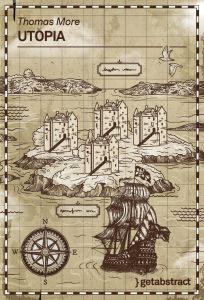
Utopia
- Utopian
- Renaissance
What It’s About
Ideal Society and Ideal State
Can the world be a better place? Are there rules and codes of conduct that would allow a society to exist in just and harmonious balance? As far back as records reach, people have struggled to understand what is necessary for a stable and contented world. As the Renaissance spread to Northern Europe, Thomas More looked around him and keenly felt the difference between the rough and tumble of Tudor England versus the sort of society that would offer dignity and opportunity to his fellow men. Taking inspiration from the discoveries of the explorers, starting with the Portuguese navigators and Columbus, he placed his speculations of what a decent society would look like by inventing a description of a newly discovered land: Utopia. As the fictional narrator, a Portuguese seafarer, recounts how the Utopians deal with property, commerce, social relations, governance and even criminality, More explores how a constructive and humanist society might operate. While some elements of Utopia seem quite modern, others such as slavery and strict patriarchy can seem surprising. Clearly, elements of Utopia reflect More’s ideals, and he may even have thought them practical – such as the treatment of criminals. Others may be simple speculation or even satire. What is most important is that More moved beyond moralizing to envision what the utopian society might look like and thereby to start a long tradition of utopian and dystopian writing that remains as vital today as it was in 1516.
Summary
About the Author
Sir Thomas More (venerated in the Catholic Church as Saint Thomas More) was born in 1478, the son of a distinguished London judge. He embarked on an impressive legal career that would take him as far as the court of King Henry the VIII. As a child, he was educated at the court of Archbishop John Morton of Canterbury. More studied in Oxford and became a member of the House of Commons in 1504. In 1518, the king appointed him his personal adviser. In 1523, he moved on to the position of Speaker of the House of Commons and in 1529 that of Lord Chancellor. Henry the VIII sent the gifted lawyer on sensitive diplomatic missions abroad, which More mastered successfully. Much to his father’s chagrin, he showed an early interest in literature, writing epigrams (short satirical poems). He was well-versed in the Latin and Greek classics and, inspired by his close friendship with Erasmus of Rotterdam, engaged in the philosophical discourse of the Renaissance and humanism. Erasmus honored More as an exceptional human being who did everything for his friends. More was a devout Catholic, and in his youth, he sincerely contemplated priesthood. Yet he opted for a secular life, married and had children. He remained loyal to his faith and the Catholic Church, considering himself a servant of God and the Pope. This in turn resulted in a conflict with Henry VIII, who in 1534 demanded the submission of the clergy to the crown and claimed the supreme right to decide on matters of faith, thus usurping the privileges of the Pope. More refused allegiance to his king and resigned. Henry VIII tried him for treason and had him beheaded in 1535 at age 57. The Catholic Church beatified More in 1886 and canonized him in 1935. In its view, he was someone who fought against the unlawful interference of the state in church affairs and died for his beliefs. In 2000, Pope John Paul II declared More “the heavenly patron of statesmen and politicians.”








Comment on this summary